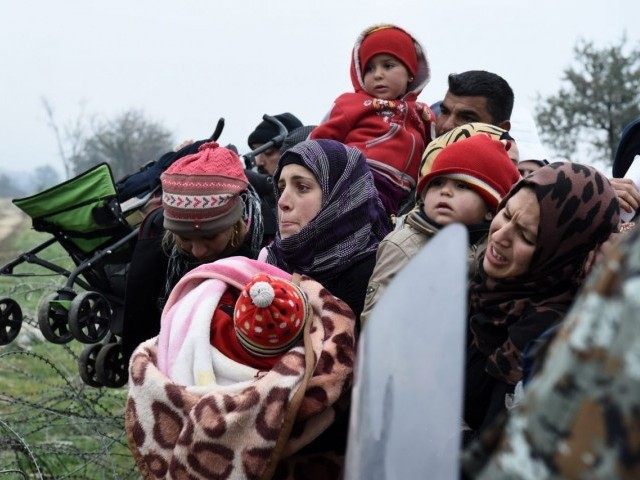ALLENTOWN, Pa. (AP) — A few days ago, a pastor asked Syrian-born restaurant owner Marie Jarrah to donate food to a welcoming event for recently arrived Syrian refugees. Jarrah, who said she regularly helps people in need, declined.
Like many of Allentown’s establishment Syrians, she doesn’t think it’s a good idea to bring refugees to the city. She clung to that view even before last week’s terrorist attacks in Paris. “Problems are going to happen,” said Jarrah, co-owner of Damascus Restaurant in a heavily Syrian enclave.
As debate intensifies nationally over the federal government’s plan to accept an additional 10,000 refugees from war-ravaged Syria, a similar argument is taking place in Allentown – one with a sectarian twist.
Pennsylvania’s third-largest city is home to one of the nation’s largest populations of Syrians. They are mostly Christian and, in no small number, support Syrian President Bashar al-Assad – a dynamic that’s prompting some of them to oppose the resettlement of refugees, who are Muslim and say they fled violence perpetrated by the Assad regime.
Aziz Wehbey, an Allentown auto dealer and president of the American Amarian Syrian Charity Society, worries some Syrian refugees might have taken part in the fighting in Syria’s civil war and have “blood on their hands.”
“We need to know who we are welcoming in our society,” said Wehbey, who immigrated to the United States a quarter-century ago and became a citizen.
The Obama administration says refugees must undergo a rigorous screening process that can take years. Nevertheless, the U.S. House voted overwhelmingly Thursday to make it more difficult for Syrian and Iraqi refugees to come to America.
Refugees say that they are aware of the opposition of some of Allentown’s Syrians to their presence, but that they have not witnessed overt hostility or discrimination. Three refugees spoke to The Associated Press on condition of anonymity because they worry the Assad government has informants in the city of about 120,000 – a widely held belief among Syrians here, both Christian and Muslim – and will retaliate against family back home.
The refugees said they’re here to make a new life for themselves, not to stir up trouble. They have formed their own miniature support network, with earlier arrivals helping newcomers. Dozens have resettled in Allentown since March, with dozens more slated to come.
“I hope that one day I’m going to be a citizen of this great country,” said one man, a married father of four.
The Muslim Association of Lehigh Valley, a mosque and school outside Allentown, has been working with the refugees, integrating them socially, sorting through donations of clothes, appliances and school supplies, and enrolling them in English-language classes.
“There’s a lot of rhetoric, but we try not to even acknowledge the rhetoric, because right now there’s a crisis,” said Sherrine Eid, refugee coordinator at the Muslim Association. “We have much bigger fish to fry.”
The refugees are joining a Syrian community that dates to the late 1800s. Now numbering some 5,200 in the greater Lehigh Valley region, Syrian-Americans are deeply intertwined in Allentown’s business and political life. The retired police chief, of Syrian descent, was elected county sheriff this month.
Some Syrian Christians say they welcome the refugees.
“I don’t have a problem with anyone coming here. I came to America as an immigrant. That’s what I am,” said Osama Dayoub, 23, who was raised in Syria but moved to Allentown in 1999 and gained citizenship. “You’re going to make them feel uncomfortable? No. Let them live.”
An Orthodox church where many pro-Assad Syrians worship – and which recently sent a delegation to the Russian embassy in Washington to express gratitude for Russia’s backing of Assad and its airstrikes in Syria – is hosting a benefit next month for Syrian refugees locally and abroad. The church has already directly assisted a Muslim refugee family in Allentown.
“We are concerned like everyone else,” said Nasser Sabbagh, a board member of St. George Antiochian Orthodox Church and brother of the pastor. “We are concerned about the safety of the Lehigh Valley community and the Syrian community.” But, he said, the refugees “are not terrorists. . I don’t think we should isolate them and push them way.”
On Sunday, religious leaders are hosting an interfaith event to welcome refugees to the area. The refugees have expressed reluctance to attend – concerned about a backlash in the wake of the Paris attacks – but the Rev. Larry Pickens, the event’s coordinator, said he is working to “make them feel secure.”
The event is meant to “break down a barrier or two,” Pickens, ecumenical director of the Lehigh Conference of Churches, said earlier this month. “There’s a lot of distrust.”

COMMENTS
Please let us know if you're having issues with commenting.